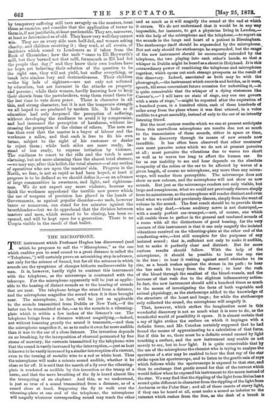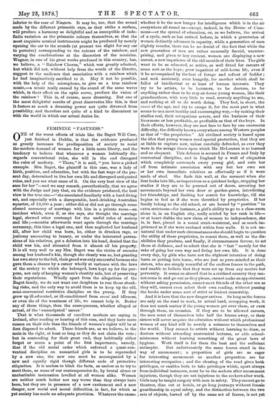THE MICROPHONE.
THE instrument which Professor Hughes has discovered (and which he proposes to call the "Microphone," as the one which enables you to send sound to a great distance is called the "Telephone,") will certainly prove an astonishing step in advance, not only for the science of Sound, but for all the sciences in which sounds are the symptoms of changes hitherto undiscoverable by man. It is, however, hardly right to contrast this instrument with the telephone, as the microscope is contrasted with the telescope. For the microphone apparently will be just as applic- able to the hearing of distant sounds as to the hearing of sounds that are near. The telephone brings the sound from a distance, and the microphone magnifies the sound when it is thus brought near. The microphone, in fact, will be just as applicable to the sounds transmitted from Dublin or New York,—if the latter can be transmitted so far,—as to the sounds in a vibrating- plate which is within a few inches of the listener's ear. The telephone brings from a distance without magnifying,—indeed, not without lessening greatly the sound it transmits,—and then the microphone magnifies it, so as to make it even far more audible than it was to the ear of a close listener. The invention depends on so breaking, by the interposition of charcoal permeated by fine atoms of mercury, the currents transmitted by the telephone-wire that the sound is vastly increased by the interruption,—just as heat is known to be vastly increased by a similar interruption of a current, even to the turning of metallic wire to a red or white heat. Thus the microphone will make a minute sound audible, whether it be close or far off. It is said that the march of a fly over the vibrating- plate is rendered as audible by this invention as the tramp of a horse, and that the mere breathing of the fly is heard almost like the trumpeting of an elephant. And this, as we understand, is just as true of a sound transmitted from a distance, as of a sound close at hand. Supposing the fly to walk over the vibrating-plate at one end of the telephone, the microphone will magnify whatever corresponding sound may reach the other
end as much as it will xaagnify the sound at the end at width it occurs. We do not understand that it would be in any way
impossible, for instance, to get a physician living in London,... with the help of the microphone and the telephone,—,to report ori the sounds in the lungs and heart of a patient in Birmingham. The stetbescope itself should le superseded by the microphone. But not only should the stethescope be superseded, but the magi of the new instrument should be enormously extended by ,the telephone, the two playing into each other's bands, so that a
whisper in Dublin might .be heard as a shout in •Holyhead. It is this extraordinary power of •combining the telephone and -microphone together, which opens out such strange prospects as the result of this discovery. Indeed, associated as both may be with the phonograph,—the instrument which records and bottles, as it were, speech, -till some convenient future occasion for unbottling it,—it is quite conceivable that the whisper of a . dying statesman like Cavour's,—" I will have no state of siege, any one can govern with estate of siege,"—might be repeated after the expiration of a hundred years, in a hundred cities, each of them hundreds of miles away from the place where it was -first uttered, in a voice audible to a great assembly, instead of only to the ear of an intently listening friend.
But the most curious results which we can at present•anticipate from this marvellous microphone are results due not so much to the transmission of these sounds, either in space or time, as to the discovery through its means of new sounds now inaudible. It has often been observed that other creatures' ears must perceive notes which we do not at present perceive at all ; must perceive •the vibrations due to waves too short as well as to waves too long to affect the human ear. So far as our inability to see and hear depends on the absolute
incapacity of the retina or the ear to be affected by waves of a given length, of course no microphone, any more than any micro-
scope, will render them perceptible. The microscope does not show us new colours, and the microphone will not show us new sounds. But just as the microscope renders not only visible, but large and conspicuous, what we could not previously discern simply
from its minuteness, so the microphone will render distinct amieveu loud what we could not previously discern, simply from the.want of
volume in the sound. The first result should be to provide those
who are only deaf,—whose auditory nerve is not destroyed?... with a nearly perfect ear-trumpet,—not, of course, one which
will enable them to gather in the general and confused pounds of a room with all the distinctness of good hearing, for the very essence of this instrument is tbat it can only magnify the isolated
vibrations received on the vibrating-plate at the other end of the conducting-wire,—but still complete for the purposes of any isolated sound ; that is, sufficient not only to make inaudible,
but to make it perfectly clear and distinct. But far more curious results should follow. With the help of the microphone, it should be possible to hear the sap rise in the -tree ; to hear it rushing against small obstacles to its rise, as a brook rushes against the stones in its path ; to hear the bee suck its honey from the flower ; to hear the rush of the blood through the smallest of the blood-vessels, and the increase of that rush due to the slightest inflammatory action. In fact, the new instrument should add a hundred times as much to the means of investigating the facts of both vegetable and animal physiology, as the stethescope added to the knowledge cd the structure of the heart and lungs ; for while the stethescope only collected the sound, the microphone will magnify it.
That, however, which strikes the imagination most in this wonderful discovery is not so much what it is sure to do, as the wonderful world of possibility it opens. It is almost certain that a ray of light strikes the surface on which it impinges with a definite force, and Mr. Crookes certainly supposed that he had found the means of approximating to a calculation of that fere% But if this be so, there must be a definite sound caused by light touching a surface, and the new instrument may enable us not
merely to see, but to hear light. It is quite conceivable that by the use of the microphone the chemist who is trying to analyse the spectrum of a star may be enabled to hear the first ray of the star
strike upon his spectroscope, and to listen to the gentle rain of rays
which follows while the spectroscope is exposed to that star, and then to exchange that gentle sound for that of the torrent which
would follow when he exposed his instrument to the moon instead of the star. We may find that the rippling of the light from Sirius hese sound quite different in character from the rippling of the light from Arcturus or the Polar Star ; and all of these onsets of starry light, if they can be heard at all, must make a eound as inferior to the cataract which rushes from the Sun, as the dash of .a brook is
inferior to the roar of Niagara. It may be, too, that the sound made by the different prismatic rays, as they strike a surface, will produce a harmony as delightful and as susceptible of inde- finite variation as the prismatic colours themselves, so that the most exquisite musical instruments might be produced by merely opening the ear to the sounds (at present too slight for any ear to perceive) corresponding to the colours of the rainbow, and Varying the combinations at the discretion of the musician. Wagner, in one of his great works produced in this country, has, we believe, a " Rainbow Chorus," which was greatly admired, but which did not, without help from the words of the libretto, suggest to the audience that association with a rainbow which he had imaginatively ascribed to it. May it not be possible, with the help of the microphone, to give us a true rainbow music,---a music really caused by the sound of the same waves which, in their effect on the optic nerve, produce the vision of the rainbow ? This is, of course, mere dreaming. But one of the most delightful results of great discoveries like this, is that it fosters so much a dreaming power not quite divorced from possibility, and therefore not quite of a kind to discontent us With the world in which our actual duties lie.



































 Previous page
Previous page